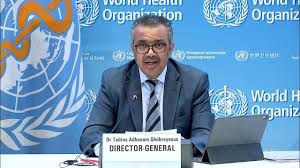Dr Tedros Adhanom Ghebreyesus, the World Health Organization (WHO) Director-General has announced Monkeypox (Mpox) a Public Health Emergency of International Concern (PHEIC).
- The declaration comes after a meeting in Geneva convened by the director general and the International Health Regulation (IHR) to assess the upsurge of Mpox this year.
- The committee has acceded that the situation constitutes a (PHEIC) which he announced on August 14, 2024.
Dr Tedros Adhanom Ghebreyesus, the World Health Organization (WHO) Director-General has announced Monkeypox (Mpox) a Public Health Emergency of International Concern (PHEIC).
The declaration comes after a meeting in Geneva convened by the Director General and the International Health Regulation (IHR) to assess the upsurge of Mpox this year.
The committee has acceded that the situation constitutes a (PHEIC) which he announced on August 14, 2024.
"Mpox has existed for more than a decade in the Democratic Republic of Congo (DRC). The number of cases reported each year has increased greatly. Last year the cases increased and already this year's cases are way higher than last year's. More than 15,600 cases reported and 537 deaths," said the director general in his opening remarks.
Read More

"The detection and rapid spread of the new clade 1b of Mpox in the Eastern DRC, its detection in neighboring countries that had not previously reported any Mpox case and the potential for the vast spread within Africa and beyond is very worrying," he added.
At the moment, cases of Mpox have been reported in Uganda, Rwanda, Burundi, and Kenya, which is a reason for alarm. Due to the emerging upsurge and outbreaks of new clades, Dr Tedros has said that a coordinated international response is needed to stop the outbreaks and save lives.
Dr Matshidiso Moeti, the WHO Regional Director for Africa, has hinted that integral efforts are already underway in close collaboration with communities and governments. He has said that their country teams are working on the frontline to help reinforce measures to curb the spread of Mpox.
"With the growing spread of the virus, we're scaling up further through coordinated international action to support countries bring the outbreaks to an end," he added.
However, the committee Chair, Professor Dimie Ogoina, has lamented the negligence in dealing with Mpox since its origin in Africa and decisively urged the committee to prevent history from recurring.
"The current upsurge of Mpox in parts of Africa, along with the spread of a new sexually transmissible strain of the monkeypox virus, is an emergency, not only for Africa, but for the entire globe. Mpox, originating in Africa, was neglected there, and later caused a global outbreak in 2022. It is time to act decisively to prevent history from repeating itself," he said.
Mpox disease, first detected in 1970 in humans in the DRC, has become an endemic in central and West Africa.
The world should remember that in July 2022, a PHEIC on Mpox was declared since it spread rapidly through sexual contact across countries where it had not been reported before. After a sustained decrease in global cases, there was a pull-down of Mpox as PHEIC in May 2023.
Currently, the new clades of Mpox cases have led to the resurrection of the PHEIC to curb the spread. The modes of transmission have also been varied and not limited to sexual networks.
The WHO works closely with countries and vaccine manufacturers for potential vaccine donations and coordinates with partners through the interim Countermeasures Network to facilitate equitable access to vaccines, diagnostics and therapeutics, including other tools to fight the rising cases.
Additionally, the WHO has initiated a release of US$15 million to fund surveillance and response activists. US$1.45 million of the total funds have already been made available from the WHO Contingency Fund for Emergencies, and the WHO anticipates releasing more soon.










